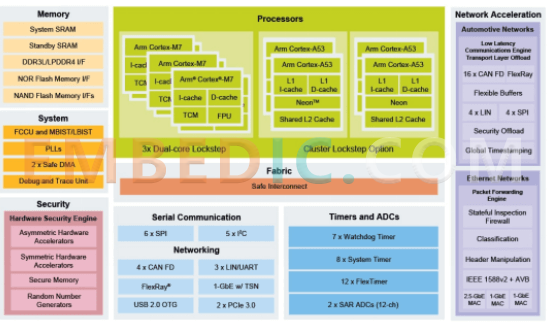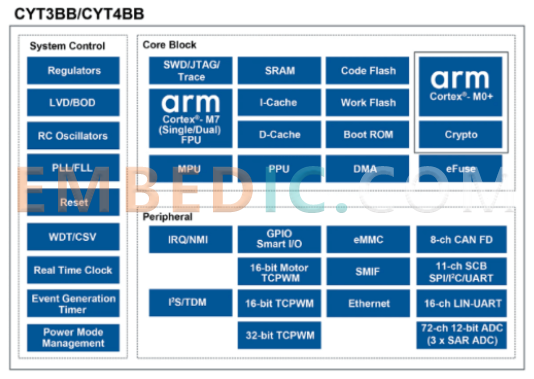The first thing that comes to mind when it comes to automotive grade chips must be MCU, 1/3 of the chips in a car are MCU. MCU plays the role of unit module control in automotive applications, such as body control, kinetic control, autonomous driving and other aspects need to use MCU. the trend of automotive electrification has been irreversible, according to the Ministry of Commerce, January to September sales of new energy vehicles by production enterprises 2.157 million units, up 1.9 times year-on-year and 1.4 times more than the same period in 2019, accounting for 11.6% of new vehicle sales by producers. New energy vehicle sales are at record highs, and the market demand for MUCs has also risen. An ordinary fuel car MCU dosage varies from 70 to 100. As electric vehicles continue to advance in the direction of intelligence, the rapid development of autonomous driving and advanced driver assistance systems, each complex functional unit requires extremely high performance MCU for its control, therefore, the MCU dosage of electric vehicles is double or more compared to that of fuel cars. In August, IC insights predicted that automotive-grade MCU sales will grow to 23% year-over-year in 2021, with a record high value of $7.6 billion.

Different levels of chips have different rigid requirements to ensure the stability of chip operation. For example, the manufacturing rigidity requirements of automotive-grade MCU are much higher than those of commercial-grade and industrial-grade chips, second only to the standards of military-grade chips. The service life, stability and temperature resistance of automotive-grade MCU have stringent requirements.
Lifetime, the car does not belong to the consumable goods, from the landing to the final use of the end of the cycle are mostly more than 10 years, so there are strict requirements for the service life, the service life of the automotive-grade MCU is much higher than the life of the car to ensure the safety of the car driving.
Stability, stability is very important to the car-class MCU, the car driving road conditions are uncertain, the design of the car-class MCU need to consider the driving process will experience collisions, jitter and other conditions on the impact of the chip and the vehicle for a long time the interference caused by the aging of the circuit, to improve the stability of the car-class MCU.
Chip work temperature resistance, automotive-grade MCU is generally assembled in the interior of the car, responsible for the control of various functional units, the car will generate a lot of heat in the process of driving, in order to ensure the safety of driving, automotive-grade MCU needs to have the ability to resist high temperature. In some regions, the temperature environment is harsh, and in winter, the temperature can be as low as below zero. Therefore, the automotive-grade MCU also needs to have the ability to resist low temperature to avoid the failure of the chip at low temperature and the failure of the car to start. The temperature range of general automotive-grade MCU is -40℃ to 150℃.
According to public data, in 2020, 98% of the market share of automotive-grade MCU is mainly occupied by foreign manufacturers, of which Renesas accounted for 30%, NXP accounted for 26%, Infineon accounted for 14%, these three companies occupy more than 50% of the market share of the top three. MCU as the core device of automotive control, the advantages and disadvantages of MCU directly affect the performance of the vehicle, the following will be the market share of the top three companies Some of the products of the top three companies in terms of market share are analyzed below.
Renesas' automotive-grade MCU is very influential in the automotive electronics market, ranking first in terms of market share in 2020, Renesas' automotive-grade MCU has excellent performance, with super processing power and extremely high command response speed, which can provide more accurate control functions, and has launched RH850, RL78; two series of automotive-grade MCU. 2016 Renesas and TSMC reached a production 28nm MCU cooperation, released in 2018 RH850, RH850 is the world's first 28nm process automotive-grade MCU, compared with the previous 40nm process MCU, in the same power consumption, processing performance increased by 3 times. The maximum flash memory of this series MCU is 16MB, and the chip has 10 built-in CAN FD interfaces and one Ethernet interface, which improves the number of connections between the chip and nodes as well as the data transmission rate.
RH850/F1KH-D8 is a set of automotive-grade MCU designed by Renesas for automotive body electrical systems. The group of chips is based on the G3KH dual-core 32-bit MCU, which ensures the consistency of the computing results of the two cores and can immediately detect faults when they occur, improving system and driving safety. Mention that the chip has the characteristics of low power consumption and high computing and processing power. Used in different control units, both can reduce the power supply current and lower power consumption. RH850/F1KH-D8 has a flash memory size of 6MB~8MB, an internal integrated CAN FD interface and Ethernet interface, and the maximum CPU running frequency has been increased to 240MHz.
NXP is also considered a leader in the automotive industry. In 2020, NXP's sales in automotive electronics accounted for 44% of total revenue, of which NXP's market share of automotive-grade MCUs is 26% in the global market. Currently NXP has launched the S32 MCU series, EAMCU series, MAC57DXXX series MCUs, and recently launched an S32K3 MCU with flash memory support from 512 KB to 8 MB, which is still in the sample stage and not in mass production. Among them, NXP's S32G high-performance MCU has been recognized by many customers. S32G mainly integrates high-performance MPU and MCU in the same chip, which significantly improves the data computing capability of the chip and reduces the complexity of the software, and is now adopted by many automotive manufacturers.

Image source: NXP
The S32G2 is an automotive-grade MCU from NXP that uses individual Arm-based Cortex-A53 cores with two-two lock-step functionality, which are mainly responsible for high-computing data processing, and three Arm-based Cortex-M7 full lock-step cores, which are mainly responsible for real-time data processing. Multiple acceleration engines are also integrated internally, a low-latency communication engine with 20 CAN interfaces for automotive processing network acceleration, a packet forwarding engine with 4 Gigabit network interfaces for Ethernet network acceleration, and a hardware security engine for secure boot and acceleration of security services. The chip meets automotive class 2 application standards and has a temperature tolerance of -40°C to 105°C.
Infineon acquired CYPRESS in 2019 to complement Infineon's automotive electronics category and fully develop the automotive semiconductor field, and Infineon will replace NXP's dominant position in the automotive electronics field to become the first in 2020 with a market share of 13.2%. In the field of automotive-grade MCU, Infineon's market share is 14%, ranking third.

Source: Infineon
The CYT3BB/4BB series are Infineon's automotive-grade MCUs, featuring a single/dual core of Cortex®-M7F with Arm architecture up to 250 MHz, 4 MB code flash and 256 KB working flash, with efficient data processing capability and excellent network connectivity, mainly used in automotive body control modules, gateway control and car entertainment systems. The CYT3BB/4BB series offers high speed data transfer and frequent data changes via 1 Ethernet interface and 8 CAN FD interfaces, in addition to 20 LIN/UART interfaces and I2C and SPI configurable serial communication interfaces. The CYT3BB/4BB series is available in a 272-pin BGA package with a temperature range of -40 to 125°C.
MCU, as the main core part of automotive unit control, has a driving role in the development of automotive intelligence. The current unprecedented prosperity of the automotive electronics market, the market demand for automotive-grade MCU market growth, many companies continue to layout the automotive electronics market, to expand production, cooperation, acquisition to enhance the influence of the market and meet the market demand for products. In China, there are also many manufacturers have launched domestic alternatives to automotive-grade MCU, relying on the strong domestic automotive market, as close as possible to the international manufacturers.
Manufacturer: Analog Devices
IC DSP 16/32B 400MHZ 176LQFP
Product Categories: DSP
Lifecycle:
RoHS:
Manufacturer: Texas Instruments
IC DSP FIXED-POINT 737FCBGA
Product Categories: DSP
Lifecycle:
RoHS:
Manufacturer: Texas Instruments
IC DSP FIXED-POINT 737FCBGA
Product Categories: DSP
Lifecycle:
RoHS:
Manufacturer: Texas Instruments
IC DSP FLOATING POINT 176HLQFP
Product Categories: DSP
Lifecycle:
RoHS:
Looking forward to your comment
Comment